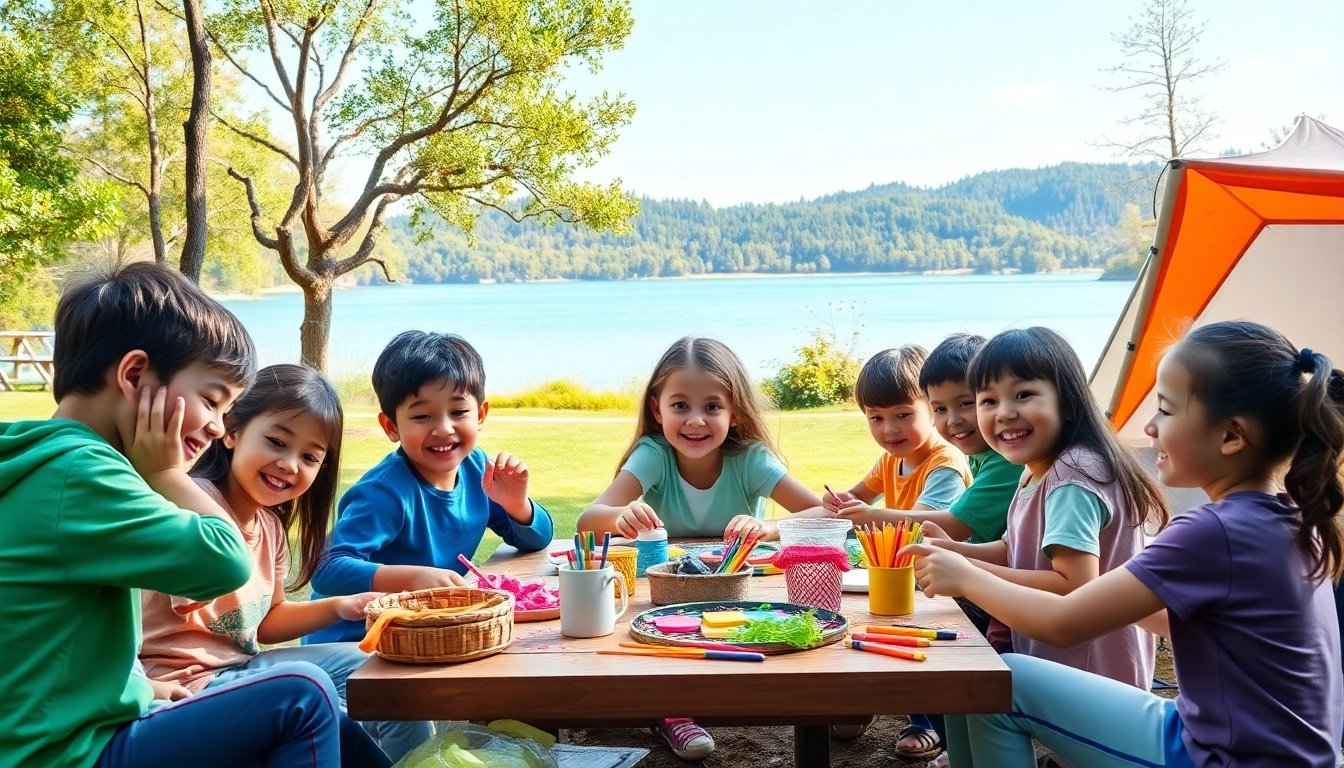Engaging Holiday Camps for Kids: Discover Fun Activities and Lasting Memories
Understanding Holiday Camps: What to Expect
As parents, we constantly look for enriching experiences for our children, especially during school holidays. One popular solution is enrolling kids in holiday camps, which provide a wealth of structured activities and opportunities to socialize. In this detailed exploration, we’ll dive into what holiday camps are, the activities they offer, and what parents can anticipate when their children attend these camps.
Definition and Purpose of Holiday Camps
Holiday camps are organized programs that provide children and teenagers with various activities during school breaks. These camps can vary in duration from a single day to several weeks and often focus on fun, education, and skill development. The purpose of holiday camps is not only to keep children engaged but also to foster a sense of independence and confidence in a controlled environment. Many camps emphasize outdoor activities, teamwork, and creativity, enabling kids to explore new interests and hobbies they might not otherwise encounter.
Types of Activities Offered at Holiday Camps
Activities at holiday camps can be as diverse as the interests of children. Typical offerings include:
- Arts and Crafts: Kids can unleash their creativity by engaging in painting, sculpting, and various DIY projects.
- Sports and Physical Activities: Camps often incorporate sports like soccer, basketball, or swimming to promote physical fitness and teamwork.
- Nature Exploration: Many camps highlight outdoor education, allowing children to engage with nature through hiking, camping, and environmental projects.
- STEM Activities: With a growing emphasis on science, technology, engineering, and mathematics, many camps incorporate fun, hands-on STEM experiences.
- Team-Building Exercises: These are designed to improve communication, cooperation, and problem-solving skills among participants.
Age Groups and Camp Themes
Holiday camps cater to various age groups, from preschoolers to teenagers. This segmentation allows for age-appropriate activities that resonate with specific developmental stages. Common themes include:
- Adventure Camps: Focus on outdoor activities and challenges, perfect for thrill-seekers.
- Arts Camps: Dedicated to creative expression through drama, dance, music, and visual arts.
- Science and Technology Camps: Aim to inspire younger generations to explore STEM topics through interactive projects.
- Sports Camps: Hone skills in specific sports while promoting teamwork and athletic endurance.
Benefits of Attending Holiday Camps
Beyond just fun, holiday camps offer a myriad of benefits that contribute to a child’s personal and social development. Here’s a breakdown of some key advantages.
Social Skills Development Through Group Activities
Every child thrives in social situations, and holiday camps provide a unique platform for developing crucial social skills. During camp, children interact with peers from diverse backgrounds, facilitating friendships and enhancing their interpersonal skills. Camp activities are inherently collaborative, requiring teamwork, communication, and shared responsibility. These experiences are invaluable for children, teaching them how to navigate social relationships and build lasting connections.
Physical and Mental Health Benefits
Engaging in physical activities at holiday camps encourages children to adopt healthier lifestyles. Participating in sports and outdoor adventures not only improves physical fitness but also enhances mental well-being. Activities like hiking or team sports stimulate the production of endorphins, the body’s natural feel-good chemicals, reducing stress and anxiety levels. Furthermore, structured play and activities can improve attention spans and overall mental health, helping children return to school mentally revitalized.
Building Lifelong Friendships
One of the most cherished outcomes of attending holiday camps is the opportunity to cultivate lifelong friendships. Sharing experiences, challenges, and achievements creates strong bonds among campers. Many kids leave camp with friends they will keep for years, often reuniting during subsequent camp sessions or outside activities in their local communities.
Choosing the Right Holiday Camp
Selecting the right camp can seem daunting given the numerous options available. Here are essential factors to consider to ensure a good fit for your child.
Key Factors to Consider: Location, Safety, and Schedule
When evaluating holiday camps, consider their location, especially in relation to your home. Proximity can be crucial for practical reasons, such as ease of drop-off and pick-up, and is particularly important if transportation logistics might be a concern. Safety is paramount; ensure that the camp adheres to strict safety protocols, including trained staff, emergency procedures, and health standards.
Schedules also play a significant role. Find camps that align with family vacations or school holiday periods to maximize attendance flexibility. Understanding the camp’s daily routine can help determine if it suits your child’s needs and interests.
Reviews and Recommendations from Other Parents
Before committing to a holiday camp, seeking feedback from parents who have previous experience with the camp can be invaluable. Online reviews, parent testimonials, and discussions in community groups can provide insights into the camp’s environment, staff professionalism, and overall satisfaction levels. Furthermore, direct recommendations from friends or family can often lead you to hidden gems.
Questions to Ask Camp Organizers
Do not hesitate to directly approach camp organizers with any queries. Here are some essential questions to consider:
- What is the counselor-to-camper ratio, and what qualifications do staff members possess?
- What activities will my child be participating in daily?
- How does the camp handle emergencies or medical issues?
- Are there opportunities for parents to visit the camp or attend events?
- What is the refund policy in case of unforeseen circumstances preventing attendance?
Planning Your Child’s Holiday Camp Experience
To ensure that your child has an enjoyable and stress-free camp experience, careful planning is essential. Here’s how to set your child up for success.
Preparing Kids for Their First Camp Experience
For many children, attending a holiday camp can be their first taste of independence. To prepare your child, start discussing the camp experience in advance. Explain what to expect—activities, new friends, and daily routines—while addressing any concerns they may have. If possible, arrange a pre-camp visit to familiarize them with the environment and staff, which can alleviate initial anxieties.
Packing Essentials for a Successful Camp
Successful packing makes a world of difference in the camp experience. Essential items to include are:
- A refillable water bottle to stay hydrated.
- Comfortable clothing suitable for various activities and weather conditions.
- Hats and sunscreen for protection against sun exposure.
- Personal hygiene items like toothbrushes and hand sanitizers.
- Any medications with clear instructions.
- A comfort item such as a stuffed animal or a memory book to ease homesickness.
Tips for Parents and Guardians During Camp Periods
While your child is at camp, staying informed and involved can help maintain a healthy parent-child connection. Encourage your child to share their daily experiences when you see them. Setting up a designated ‘camp journal’ can be an excellent way for them to express their thoughts and feelings. It’s also beneficial to foster an open line of communication: reassure your child it’s okay to reach out if they need to talk or face challenges during their camp experience.
Local Holiday Camps: Finding Options Near You
Finding the perfect local holiday camp requires research and due diligence. It’s essential to look for camps that have a solid reputation and meet your child’s needs from both educational and social perspectives.
Popular Holiday Camps in Your Region
Depending on your locality, various camps may exist that cater to different interests. You can typically find information via community newsletters, social media groups, or local parenting forums. Researching what’s available in your area will allow your child to participate in camps tailored to their interests.
Camp Pricing and Scholarships Available
The cost of holiday camps can vary significantly based on factors such as location, duration, and types of activities offered. Be sure to inquire about any financial aid or scholarship opportunities that can ease the financial burden. Many camps offer reduced pricing for early registration or referrals, so it’s worth exploring available options.
Final Thoughts on Preparing for Holiday Camps
In conclusion, holiday camps provide invaluable experiences that can significantly impact a child’s personal growth, social skills, and physical health. With thoughtful preparation, meticulous planning, and informed decision-making, you can ensure that your child enjoys a memorable time at camp—a time filled with fun activities, new friendships, and lasting memories.



